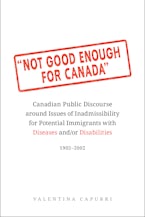Not Good Enough for Canada investigates the development of Canadian immigration policy with respect to persons with a disease or disability throughout the twentieth century. With an emphasis on social history, this book examines the way the state operates through legislation to achieve its goals of self-preservation even when such legislation contradicts state commitments to equality rights.
Looking at the ways federal politicians, mainstream media, and the judicial system have perceived persons with disabilities, specifically immigrant applicants with disabilities, this book reveals how Canadian immigration policy has systematically omitted any reference to this group, rendering them socially invisible.









